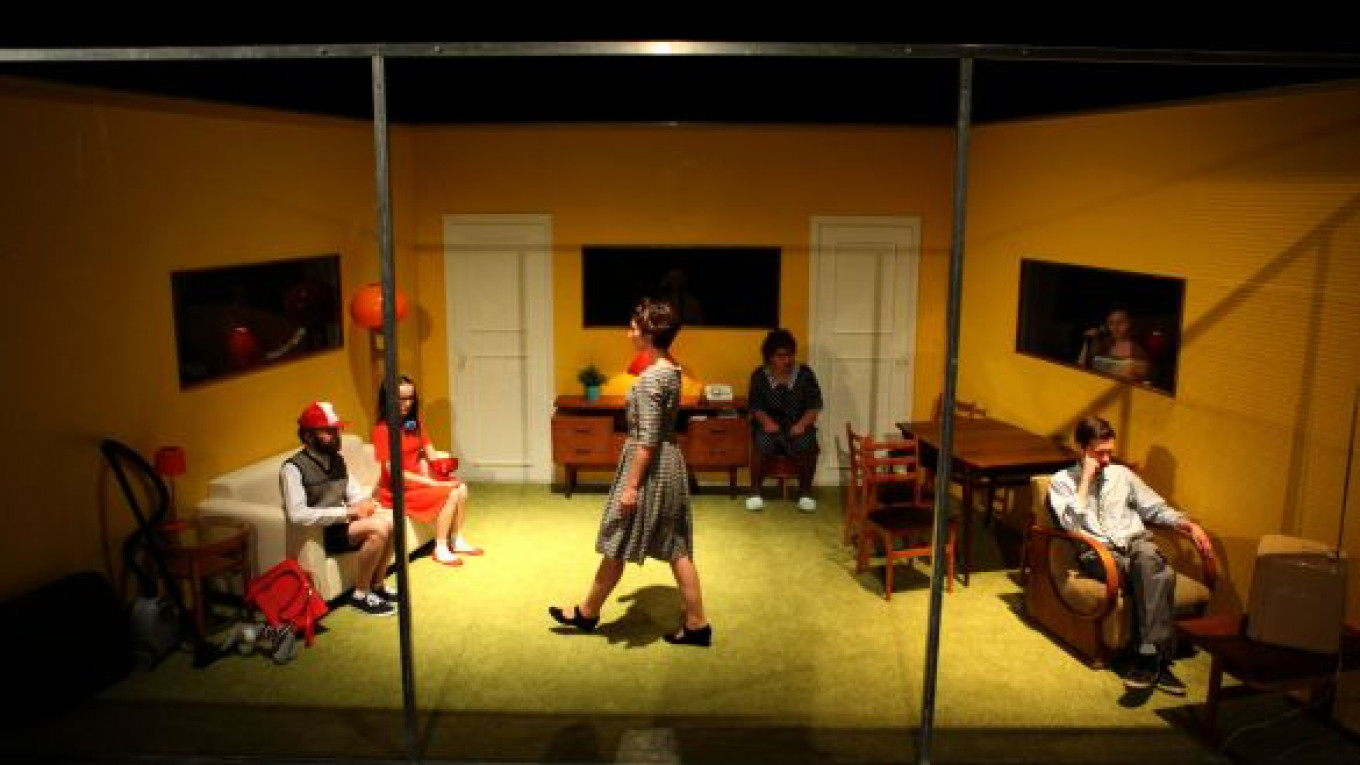What a start to the new season! The hot new Gogol Center hit the ground running. Lyubimovka, as always, kicked everyone in the pants. The Meyerhold Center, after laying low a couple of seasons, is tossing out new shows like fireworks on a holiday. And that's just the beginning.
But let me get to one of those Roman candles.
"Papa Leaves, Mama Lies, Grandma Dies" at the Meyerhold Center is a spectacular new show that balances humor, irony, depth of meaning, stylized beauty and the grotesque with almost miraculous agility.
It's not everybody's cuppa tea, I'll say that right now. During the show I attended, more than a few disgruntled spectators struggled through the packed aisles of spectators to make early exits. One of the noisiest of them even drew a bemused look from one of the performers on stage — a reader of text who, at that moment, was not occupied.
Yes, a reader of text. You read that right.
The entire piece is narrated by three readers (Mikhail Yefimov, Svetlana Mikhalishcheva and Natalya Tereshkova) who stand at windows impassively but attentively looking into a closed, four-wall box designed by Yekaterina Shcheglova. The actors inside, playing members of a nuclear family, never say anything we can make out — unless you're good at lip reading at a distance through a plexiglass wall.
Director Yury Muravitsky, who staged the hit in-yer-face, rock 'n' roll-meets-docudrama "Light My Fire" at Teatr.doc a few seasons ago, came up with a completely different approach in "Papa Leaves." He and his cast nailed it with the same precision.
All kinds of associations come to mind. Is this a spoof of television? Is it futuristic theater? Is it 3-D comics? There is a bit of all that, I suspect. But primarily, this is a deeply insightful exploration of human psychology and the human experience.
It's done rather as Picasso did portraits in his Cubist period, pulling real and recognizable qualities out of a familiar image and putting them back together in a new setting.
This is where the text comes in, one of the most striking that I have encountered in theater in a while. The source is French author Fabienne Yvert's book, "Papa Leaves, Mama Lies, Grandma Dies." It was given a superb Russian sheen by Yekaterina Bondarenko.
Imagine Hemingway gone berserk: short, declarative sentences piling up against one another like speeding cars on the autobahn in the fog. Each one contradicts, ignores or refutes what preceded it.
Did Papa commit suicide, poison his family or escape to visit interesting places?
Each one of these claims is made matter-of-factly by the readers outside the box as we watch the slightly robotic figures inside enter and exit, eat, sleep, watch television, talk, fight, vacuum, celebrate birthdays and funerals, and daydream.
The basic events are what you would expect from a show with this title. Father (Grigory Kalinin) apparently leaves home, Mother (Svetlana Kamynina) struggles to cope with that, and Grandmother (Dmitry Arosyev), seeing an angel, follows it into the other world. The details of the story are told through the eyes of the children — a precocious girl (Cecil Plezhe) and her hard-headed brother (Artyom Semakin), whose thick beard and crooked baseball cap help build a marvelously skewed image.
Who are these people?
They are made up of hundreds of diverse, mutually exclusive desires and impulses. How can we possibly know either Papa or Mama, with their unique, ever-changing urges for freedom? The phrases describing their inner worlds cascade down upon us, reminding us that a single individual actually comprises so many that it's impossible to define him or her with any concrete description.
In the end — and, because of the purposefully strange, amorphous nature of this production, I don't feel like I'm giving anything away — it may be that little which is declared in the title actually takes place. Maybe these events are merely passing impulses, electrical sparks in someone's brain?
I do think Grandma dies. Death we don't avoid.
But everything that comes before it — who knows? "Papa Leaves" is a colorful, sometimes rude, occasionally harrowing, frequently funny, often endearing, rarely trustworthy, but always thought-provoking ride through one family's absolutely unrepeatable experience.
"Papa Leaves, Mama Lies, Grandma Dies" (Papa Ukhodit, Mama Vryot, Babushka Umirayet) plays Sat. at 8 p.m. at the Meyerhold Center, located at 23 Novoslobodskaya Ulitsa. Metro Mendeleyevskaya. Tel. 495-363-1048. meyerhold.ru. Running time: 1 hour, 20 minutes.
Contact the author at [email protected]
A Message from The Moscow Times:
Dear readers,
We are facing unprecedented challenges. Russia's Prosecutor General's Office has designated The Moscow Times as an "undesirable" organization, criminalizing our work and putting our staff at risk of prosecution. This follows our earlier unjust labeling as a "foreign agent."
These actions are direct attempts to silence independent journalism in Russia. The authorities claim our work "discredits the decisions of the Russian leadership." We see things differently: we strive to provide accurate, unbiased reporting on Russia.
We, the journalists of The Moscow Times, refuse to be silenced. But to continue our work, we need your help.
Your support, no matter how small, makes a world of difference. If you can, please support us monthly starting from just $2. It's quick to set up, and every contribution makes a significant impact.
By supporting The Moscow Times, you're defending open, independent journalism in the face of repression. Thank you for standing with us.
Remind me later.







